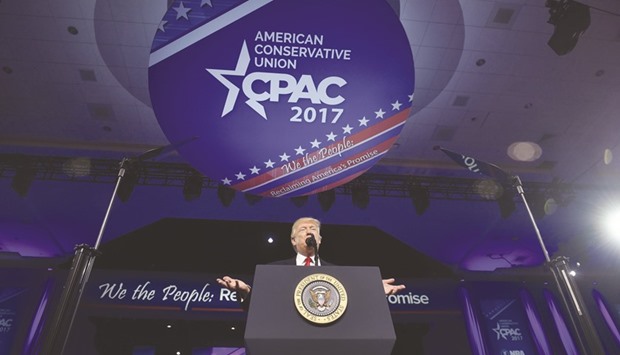President Donald Trump has said that he would make a massive budget request for one of the “greatest military build-ups in American history” in a feisty, campaign-style speech extolling robust nationalism to eager conservative activists.
Trump used remarks to the Conservative Political Action Conference (CPAC), an organisation that gave him one of his first platforms in his improbable journey to the US presidency, to defend his unabashed “America first” policies.
Ahead of a nationally televised speech to the US Congress on Tuesday, Trump outlined plans for strengthening the US military, already the world’s most powerful fighting force, and other initiatives, though he again offered few specifics.
He said he would aim to substantially upgrade the military in both offensive and defensive capabilities, with a massive spending request that would make the country’s defence “bigger and better and stronger than ever before”.
“And, hopefully, we’ll never have to use it, but nobody is going to mess with us. Nobody. It will be one of the greatest military build-ups in American history,” Trump said.
With appeals to people on welfare to go to work and pledges to follow through on his vow to build a wall on the US-Mexican border, Trump drew rounds of applause from the large gathering of conservatives, many of them wearing hats emblazoned with the president’s campaign slogan, “Make America Great Again”.
His speech was heavy on the nationalist overtones from his campaign last year, focusing heavily on promises to boost US economic growth by retooling international trade deals, rolling back regulations and boosting energy production,
Trump is looking to put behind him a rocky first month in office.
An executive order he signed aimed at banning people from seven Muslim-majority countries became embroiled in the courts and he had to fire his national security adviser, Michael Flynn, for lying about Russian contacts before Trump took office.
With the federal budget still running a deficit, Trump will have to square his request for a military build-up with his plans to cut taxes for most Americans and for corporations.
During his speech, he complained about spending caps that were put in place on the defence budget dating back to 2011.
Trump also heaped criticism on what he called purveyors of “fake news”, seeking to clarify a recent tweet in which he said some in the US news media should be considered an “enemy of the people”.
“I’m against the people that make up stories and make up sources. They shouldn’t be allowed to use sources unless they use somebody’s name. Let their name be out there,” Trump said. “Let there be no more sources.”
Trump has repeatedly chosen to make news media criticism a focus of his public remarks since taking office on January 20.
He intensified his verbal attacks on Sweden, France and Germany Friday, painting swaths of Europe as a Islamist militant-infested hellscape.
“Take a look at what’s happening in Sweden. Take a look at what’s happening in Germany. Take a look at what’s happened in France. Take a look at Nice and Paris,” he said. (see also page 11)
Trump trained his sights on Paris in particular, recounting the story of a friend who used to visit every year.
“I have a friend, he’s a very, very substantial guy. He loves the City of Lights,” he said.
After not seeing his friend for a few years, Trump said he asked: “‘How is Paris doing?’”
The US leader said his friend responded: “Paris? I don’t go there anymore. Paris is no longer Paris.”
Trump added: “That was four years, four or five years, he hasn’t gone there.”
He also defended contentious comments linking immigration and crime in Sweden.
He earlier issued bafflingly opaque remarks that suggested the peaceful Scandinavian country was undergoing significant unrest or attack.
“I took a lot of heat on Sweden,” he said. “Take a look at what happened in Sweden. I love Sweden. Great country. Great people. I love Sweden. But they understand, right, the people over there understand I’m right.”
The speech allowed Trump to put his stamp firmly on the conservative political movement, even as some activists fretted that his immigration and trade policies go too far.
With Trump in the White House and Republicans holding majorities in both houses of Congress, the CPAC and the thousands of conservative activists who flock to the event each year from across the country are seeing their political influence rising.
In an interview with Reuters on Thursday, Trump talked about imposing some form of a border tax to encourage more US manufacturing.
He called the Chinese “grand champions” of currency manipulation that hurts US exports and he talked of expanding the US nuclear arsenal.
Several CPAC attendees voiced concerns about some of Trump’s actions in his first month in office, and worried that he might take the US economy in the wrong direction.
Abby Oliver, of Grand Rapids, Michigan, who interns for a local Republican Party organisation, said that while she wanted to see the United States better control its borders, she had concerns about the “controversial” travel ban executive order.
She said that the order, which caused protests and chaos at airports the weekend after its enactment, was “rolled out a little bit haphazardly” and she worried that Trump could go too far on immigration policy.
“I don’t want it to become (a situation where) people are being ripped apart from their families,” Oliver said.

Trump: nobody is going to mess with us. Nobody. It will be one of the greatest military build-ups in American history.
